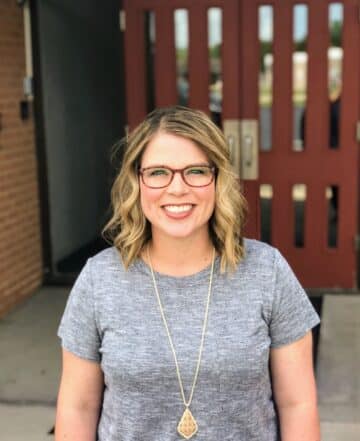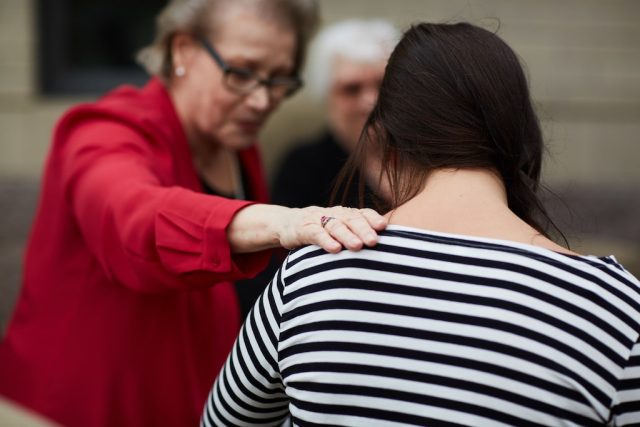Article
When the Church is Growing but Your Womb is Empty
For many women in ministry, infertility is an invisible grief.

It’s one thing to walk through infertility. It’s another thing to do it while planting a church.
Because in church planting, you’re always holding out hope. You’re sowing vision. You’re carrying life and momentum and energy into rooms that feel empty. You’re talking about growth and multiplication and fruitfulness, while quietly wondering if your own body will ever reflect the same.
This is the tension I lived in. And it’s one so many women live in quietly—especially pastor’s wives.
I was grateful. But I was also devastated. And no one really talked about how those two can coexist.
I walked through infertility for four long years. In that time, I remember hosting baby showers when I was still mourning from another month of disappointment. I babysat for so many young families. I smiled for photos, baked cupcakes, bought gifts—and then cried in the car on the way home. I remember worshiping while my heart felt numb from grief. I remember someone telling me, “But … God is using you in so many people’s lives!” as if that meant I didn’t have permission to grieve the ones I’d lost or never held.
Every Mother’s Day was like a fresh wound. I begged God for answers. All I longed for was to be a mother. Isn’t that a spiritual and noble calling? Why would He withhold that from me?
After years of unanswered prayers, I felt God speak gently to my heart: “I’ve called you to minister to hurting and broken people—and the most real way for you to do that is to walk through deep hurt and brokenness yourself.”
God really met me in that pain. Not when I pushed it down, but when I finally allowed myself to feel it and grieve it. That’s where His presence became real.
I’ll never forget when we were in the thick of planting a church—new faces, small groups, gospel conversations, and the momentum we’d prayed for—and I found out I was pregnant. After years of infertility and fertility treatments. Our miracle. I finally held a baby in my arms.
And then—shockingly—just three months later, I was pregnant again. This time, all on our own. No treatments. No charts. Just a miraculous, unexpected gift. The doctors had told us this wasn’t possible. We were overwhelmed in the best way.
And then came that 12-week appointment. Just three days before my very first Mother’s Day. The ultrasound tech’s face said it before her words did. She looked at me, her eyes heavy, and then spoke the words I’ll never forget: “I can’t find the heartbeat.”
The grief was instant. Intense. I laid in bed for days, unable to function. I had just come through a season of joy, and now I was plunged into one of the darkest valleys of my life. I questioned everything. I wondered if any of it was worth it.
I was leading people to Jesus while silently wondering why He felt so far away. I was giving hope to others while trying to hold onto my own. I was helping plant a church and burying a dream in the same season.
But God met me there. In the depths. It was the most real He has ever felt to me. He was often the only person I could talk to who truly understood. In those quiet, tear-soaked moments, when no words would come and I felt utterly alone, I sensed Him drawing near. Not with explanations or fixes, but with presence. With peace.
“The Lord is near to the brokenhearted and saves the crushed in spirit.” — Psalm 34:18
“Even though I walk through the valley of the shadow of death, I will fear no evil, for you are with me.” — Psalm 23:4
I clung to those words. I repeated them aloud when I didn’t feel them. And in time, they began to feel true again.
When no one else knew what to say, God didn’t give me clichés. He gave me comfort. He sat with me in my sorrow. Sometimes I would journal prayers full of questions and silence, but I never felt dismissed. Instead, I sensed a whisper in my soul: “I’m here. I know.”
“He was despised and rejected by men, a man of sorrows and acquainted with grief …” — Isaiah 53:3
Jesus wasn’t distant from pain; He entered into it. He didn’t rush me through my sadness. He met me there and stayed.
For that experience, though extremely hard, I am grateful.
The Silent Grief of Ministry Wives
For many women in ministry, infertility is an invisible grief. We know how to rally. We know how to show up. We know how to serve and smile and cheer for others. But when your womb is empty and everyone else is celebrating baby dedications and first birthdays, it can feel like God is building His Church, but bypassing your prayer.
And the pain is compounded when you’re in leadership.
Because people don’t always make space for your sorrow. They mean well. But comments like “God’s timing is perfect,” or “Maybe your calling is spiritual motherhood” can unintentionally shut down real, deep pain.
The truth? You can be called and heartbroken. You can be thankful and crushed.
Jesus never asked us to pretend we are okay when we are not.
That grief doesn’t just go away. It becomes part of your story.
Why This Needs to Be Talked About
Infertility and miscarriage are not signs of weak faith or misaligned priorities. They are human realities, and they touch the lives of many women in ministry who have learned to put their sorrow on a shelf because there’s always someone else who needs something.
But the gospel doesn’t skip over suffering. Jesus doesn’t brush past pain. He steps into it. He weeps with us. And He carries us when we can’t keep performing.
If you are a church planting wife walking through infertility or miscarriage, hear this:
You are not forgotten.
You are not faithless.
You are not alone.
You are loved by a God who sees both the church you’re building and the ache you’re carrying.
What I Wish Someone Had Told Me
- It’s okay to grieve deeply. It doesn’t make you ungrateful—it makes you human.
- You don’t have to be strong for everyone else all the time. Jesus is strong for you.
- God is not disappointed in your sadness, and He isn’t surprised by your grief.
- You are still a woman of faith, even if your prayers feel unanswered.
- You are not failing as a pastor’s wife if you need time to fall apart.
- Don’t hide your pain from others; there are more women who can relate than you think.
There’s room in the church for your sorrow. There’s room in leadership for lament. There’s a Savior who sits with you in the ashes. There’s a sisterhood of women who have walked this valley and are still walking in faith, limping sometimes, but still walking.
I promise, you’re not the only one. And your story may be the very thing that unlocks healing in someone else’s.
And one day—whether here or in heaven—all things will be made new.
Until then, keep going.
Keep grieving. Keep hoping. Keep trusting.
You are seen. You are loved. And you are not alone.
I am praying for you.




